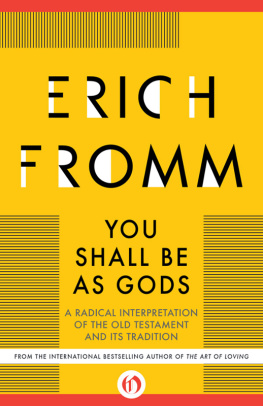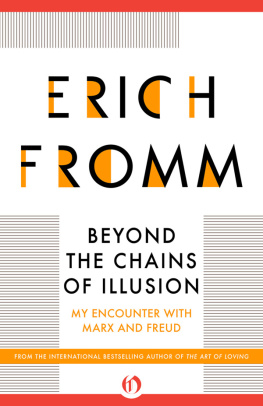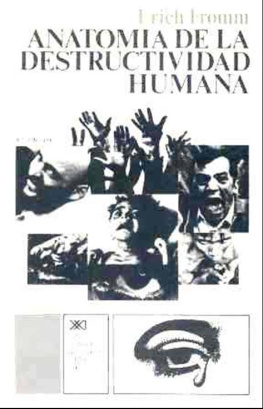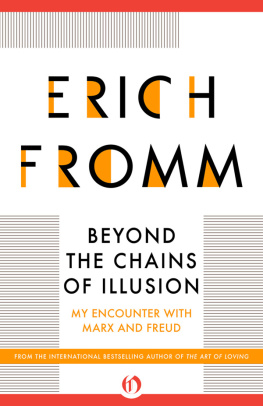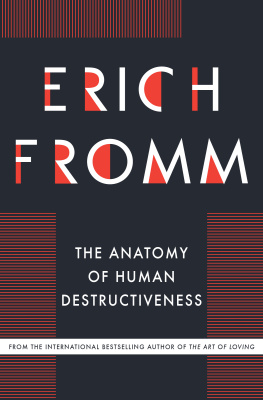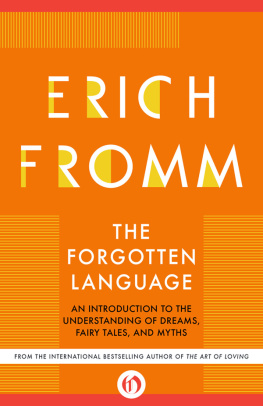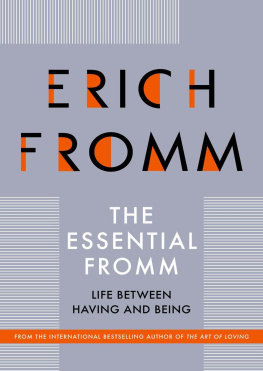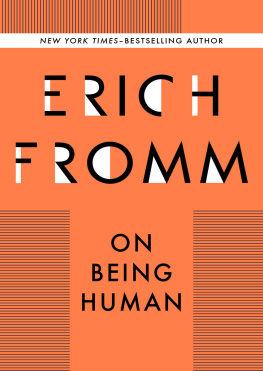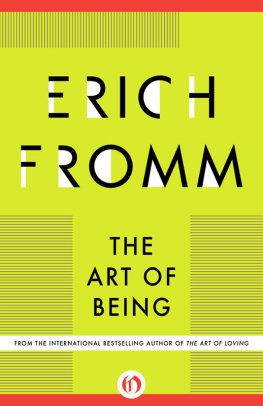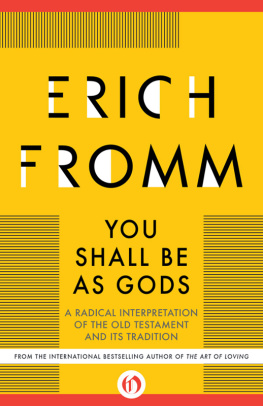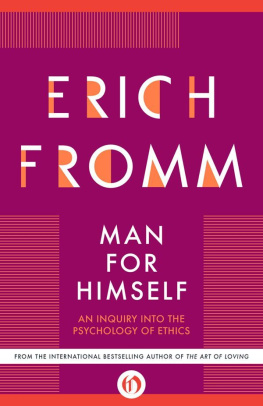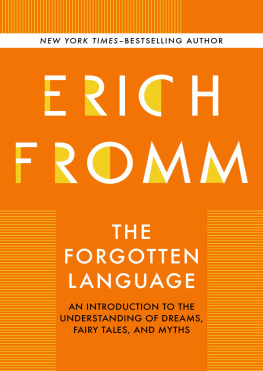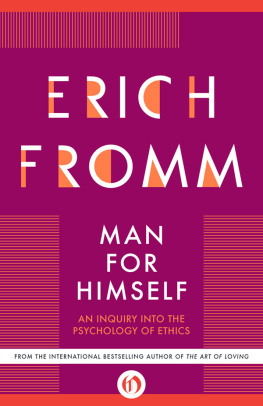
You Shall Be as Gods
A Radical Interpretation of the Old Testament and Its Tradition
Erich Fromm

Foreword
I WANT TO EXPRESS my gratitude to all those who have generously helped me in the completion of this book. Mr. Neal Kozodoy has read the whole manuscript and has made important critical and constructive suggestions that have considerably improved the book. Professor James Luther Adams, Professor Kristen Stendahl, Monsignor Ivan Illich, Father Jean Lefvbre have been most generous in helping my understanding of the Christological literature in connection with the story of the Passion. Mr. Arthur A. Cohen has also contributed valuable criticism and suggestions, and Mr. Joseph E. Cunneen has greatly helped the manuscript with his thoughtful and constructive editing.
I want to thank most warmly Miss Beatrice Mayer, who for fifteen years has not only typed and retyped all my manuscripts with great care, including this one, but who has also done a first and very helpful editing of the text.
E. F.
I. Introduction
IS THE HEBREW BIBLE, the Old Testament, more than a historical relic to which polite reverence is paid because it is the fountainhead of the three great Western religions? Has it anything to say to man todayman living in a world of revolutions, automation, nuclear weapons, with a materialistic philosophy that implicitly or explicitly denies religious values?
It would hardly seem that the Hebrew Bible could still be relevant. The Old Testament (including the Apocrypha) is a collection of writings by many authors, written during more than a millennium (about 1200 to 100 B.C.). It contains codes of law, historical accounts, poems, prophetic speeches, only a part of a larger literature produced by the Hebrews during these eleven hundred years. These books were written in a small country on the crossroads between Africa and Asia, for men living in a society that neither culturally nor socially had any resemblance to ours.
We know, of course, that the Hebrew Bible was one of the main inspirations not only of Judaism but also of Christianity and Islam, and thus deeply influenced the cultural development of Europe, America, and the Near East. Yet it seems today that, even among Jews and Christians, the Hebrew Bible is not much more than a respected voice of the past. Among most Christians the Old Testament is little read in comparison with the New Testament. Furthermore, much of what is read is often distorted by prejudice. Frequently the Old Testament is believed to express exclusively the principles of justice and revenge, in contrast to the New Testament, which represents those of love and mercy; even the sentence, Love your neighbor as yourself, is thought by many to derive from the New, not the Old Testament. Or the Old Testament is believed to have been written exclusively in a spirit of narrow nationalism and to contain nothing of supranational universalism so characteristic of the New Testament. Indeed, there is encouraging evidence of changes in attitudes and practice both among Protestants and Catholics, but much remains to be done.
Jews who attend religious services are more familiar with the Old Testament, since a portion of the Pentateuch is read each Sabbath, and on Mondays and Thursdays as well, and the entire Pentateuch is completed once every year. This knowledge is further increased by the study of the Talmud, with its innumerable quotations from the Scriptures. While those who follow this tradition are a minority of Jews today, this way of life was common to all until only about a century and a half ago. In the traditional life of the Jews the study of the Bible was fostered by the need to base all new ideas and religious teachings on the authority of biblical verses; this use of the Bible, however, had an ambiguous effect. Because biblical verses were employed to support a new idea or religious law, they were often quoted out of context, and an interpretation was imposed on them which did not correspond to their real meaning. Even where no such distortion occurred, there was often more interest in the usefulness of one verse in support of a new idea than in the meaning of the total context in which it occurred. In fact, the text of the Bible was better known via the Talmud and the weekly recitations than through direct, systematic study. The study of the oral tradition (Mishnah, Gemara, and so on) was of greater importance and a more exciting intellectual challenge.
Throughout the centuries the Bible was understood by the Jews not only in the spirit of their own tradition but also, to a considerable extent, under the influence of the ideas of other cultures with which their scholars had contact. Thus Philo saw the Old Testament in the spirit of Plato; Maimonides in the spirit of Aristotle; Hermann Cohen in the spirit of Kant. The classic commentaries, however, were written in the Middle Ages; the most outstanding commentator is R. Solomon ben Isaac (1040-1105), known as Rashi, who interpreted the Bible in the conservative spirit of medieval feudalism. This is true even though his and other commentaries on the Hebrew Bible clarified the text linguistically and logically, and often enriched it by turning to the haggadic compilations of the rabbis, the Jewish mystic lore, and sometimes to Arabic and Jewish philosophers.
For the many generations of Jews after the end of the Middle Ages, especially for those living in Germany, Poland, Russia, and Austria, the medieval spirit of these classic commentaries helped to reinforce the tendencies rooted in their own ghetto situation, where they had little contact with the social and cultural life of the modern age. On the other hand, those Jews who, beginning with the end of the eighteenth century, became part of the contemporary European culture had, in general, little interest in studying the Old Testament.
The Old Testament is a book of many colors, written, edited, and re-edited by many writers in the course of a millennium and containing in itself a remarkable evolution from primitive authoritarianism and clannishness to the idea of the radical freedom of man and the brotherhood of all men. The Old Testament is a revolutionary book; its theme is the liberation of man from the incestuous ties to blood and soil, from the submission to idols, from slavery, from powerful masters, to freedom for the individual, for the nation, and for all of mankind. Perhaps we, today, can understand the Hebrew Bible better than any age before, precisely because we live in a time of revolution in which man, in spite of many errors that lead him into new forms of dependence, is shaking himself free of all forms of social bondage once sanctioned by God and the social laws. Perhaps, paradoxically enough, one of the oldest books of Western culture can be understood best by those who are least fettered by tradition and most aware of the radical nature of the process of liberation going on at the present time.
A few words must be said about my approach to the Bible in this book. I do not look at it as the word of God, not only because historical examination shows that it is a book written by mendifferent kinds of men, living in different timesbut also because I am not a theist. Yet, to me, it is an extraordinary book, expressing many norms and principles that have maintained their validity throughout thousands of years. It is a book which has proclaimed a vision for men that is still valid and awaiting realization. It was not written by one man, nor dictated by God; it expresses the genius of a people struggling for life and freedom throughout many generations.
Next page
